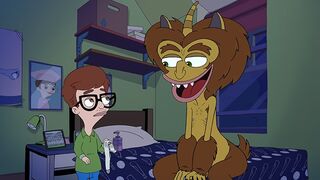OCD
Netflix’s "Big Mouth" Animates Sexual Intrusive Thoughts
Can watching a gross TV show serve as effective ERP?
Posted December 4, 2020 Reviewed by Devon Frye

Netflix's animated series Big Mouth—returning for its fourth season on December 4th—might be the grossest television show ever made. The history of art is sometimes referred to as the history of smut, and in this grand panorama of filth, Big Mouth is admittedly eclipsed by a few of the greats: the Marquis de Sade, underground comix, and the motion picture adaptation of Cats. So, in our two-thousand-year history of everything obscene, Big Mouth probably only makes the top 25.
But Big Mouth elevates its crude humor through the uncomfortable honesty of its writers and actors; produced by and starring Nick Kroll, with a cast that includes John Mulaney, Jenny Slate, Fred Armisen, Maya Rudolph, and Academy Award-winning horror/comedy maestro Jordan Peele.
Big Mouth is a show about puberty, and it portrays the interior lives of pubescents as a waking nightmare/fever dream of sexual disorientation. It bombards the characters—and audience—with surreal imagery and intrusive voices, blending the iconography of childhood with adult grotesquery. Beloved toys and innocuous household objects offer lewd comments and leering glances; the kids are harangued by a Voldemortesque "Shame Wizard," voiced by Harry Potter alum David Thewlis; and, most famously, unwanted sexual thoughts are personified as bug-eyed chimeras straight out of Where the Wild Things Are.
"What's wrong with me?" John Mulaney's Andrew despairs.
"Nothing," answers Maurice the Hormone Monster, voiced with Nick Kroll's most guttural growl. "You're a perfectly normal gross little dirtbag."
Big Mouth will induce sympathetic cringing from anyone who survived early adolescence, but I suspect it will ring especially true for anyone who wrestles with purely obsessional OCD symptoms—specifically, sexual intrusive thoughts. According to Lee Baer in Imp of the Mind, sexually intrusive OCD often starts in early adolescence, and intrusive thoughts can be some of the most disruptive and upsetting OCD symptoms:
"What do I mean by 'bad thoughts?' I mean something specific: thinking the most inappropriate things at the most inappropriate times. These thoughts, urges, and images almost always fall into one of three categories: inappropriate aggressive thoughts, inappropriate sexual thoughts, or blasphemous religious thoughts."
For example, Baer describes a young patient who became anxious and was eventually consumed by intrusive thoughts about his emerging sexual identity and fears of social rejection:
"When he was an adolescent—even though he was heterosexual—the worst thing Isaac could think of was being gay, which could cause relentless teasing by his classmates in school. So this is where the imp began his torment of Isaac. Perhaps he would stare at an attractive female classmate and feel pleasantly aroused; but the imp would lead him to think that perhaps it was really the boy sitting next to her that he was really attracted to. Soon, whenever he saw an attractive boy in school or on the street or in the gym, he would find himself scanning his body to try to feel certain that he wasn't sexually aroused."
Big Mouth, while it doesn't address OCD specifically, vividly animates this kind of obsessive anxiety about sexual thoughts. For John Mulaney's Andrew, this means enduring an eye exam administered by his Hormone Monster, who is attempting to gauge Andrew’s reaction to homoerotic imagery: graphic pornography, David Bowie in Labyrinth, and Mr. Clean making aggressive love to an improbably muscular unicorn. Intrusive thoughts don't pull any punches with obscene and explicit content; the most random and inexplicable thoughts only cause greater distress, especially since obsessing about them causes them to recur with greater frequency and intensity. As the Hormone Monster succinctly puts it, "You're picturing it, and we're talking about it."
To be clear: intrusive thoughts and obsessive anxiety around sexuality must be distinguished from the actual process of realizing one's sexual identity. Intrusive thoughts are the symptoms of an anxiety disorder, and they recur not because they are enticing, but because they trigger anxiety. Nor is discomfort with sexual intrusive thoughts necessarily indicative of discomfort with homosexuality; in Big Mouth, for instance, we see that Andrew gets along fine with his gay classmates, and he makes it clear that if he were actually gay he'd learn to be okay with it. The anxiety comes from uncertainty, from the impossibility of obtaining perfect self-understanding, and from the agony of constant, fruitless self-interrogation.
By the end of the episode, Andrew accepts that human sexuality is on a spectrum, that he's still learning about himself and growing up, and that no matter where he ends up he'll find a way to be happy. His flexible and accepting mindset is similar to what OCD patients learn to practice through Exposure Response Prevention (ERP) Therapy (see, Full Exposure: The Sickening Treatment for OCD).
ERP requires patients to directly confront the content of their thoughts. Baer explains that the "principles of exposure therapy can be stated simply: Expose yourself to the thing that most triggers your fear or discomfort for one or two hours at a time, without leaving the situation, or doing anything else to distract or comfort you." Eventually, the anxiety subsides, and the sufferer learns to let thoughts come and go without attributing any undue importance.
For sufferers of intrusive thoughts and purely obsessional OCD, ERP may take the form of exposure to explicit media that triggers their obsessions. I suspect binging a season of Big Mouth could be very effective as ERP therapy for some OCD sufferers struggling with unwanted sexual thoughts.
Rest assured: if you have intrusive thoughts OCD, Big Mouth will find a way to trigger your symptoms. But no matter how extreme it gets, the show is always sex-positive and deeply empathetic to the characters and their anxieties. In my view, Big Mouth could very well help many OCD sufferers confront and come to terms with their own intrusive thoughts—and perhaps even learn to laugh at them.
Copyright, Fletcher Wortmann, 2020
You may be interested in these other columns:
References
Lee Baer, The Imp of the Mind: Exploring the Silent Epidemic of Obsessive Bad Thoughts. Penguin Plume, New York, NY, 2002. pp. 12,27,95.
Big Mouth, Season 1, created by Jennifer Flackett, Andrew Goldberg, Nick Kroll & Mark Levin, 2017. Netflix. https://www.netflix.com/title/80117038




